Revision with unchanged content. Wars are the utlimate form of hostility, antagoism, and animosity. The Lebanese war was especially painful,devastating, and destructive. Lebanese people suffered tremendously during the 15 years of war and Lebanese women experienced times of anguish, greif, and distress. How did these women cope with the trauma and tragedy of the war given the context of the historical, social, religious, economic, and political structure of Lebanese society? What were their hopes and dreams? What were their loses? What were the factors that helped them resist violence and liberate themselves from their oppressors? Three generations of middle-class Lebanese Muslim women with different voices but with one heart that beats for their Lebanon shared their stories and experiences during the war. The author included some of her stories as she moved between interviews, between memories, and between streets in Beirut. Five protective factors emerged from this work that were instrumental in helping middle-class Lebanese Muslim women cope with the war. A Resiliency/Liberation model was developed to illustrate their journey of resilency and liberation.
Bitte wählen Sie Ihr Anliegen aus.
Rechnungen
Retourenschein anfordern
Bestellstatus
Storno








